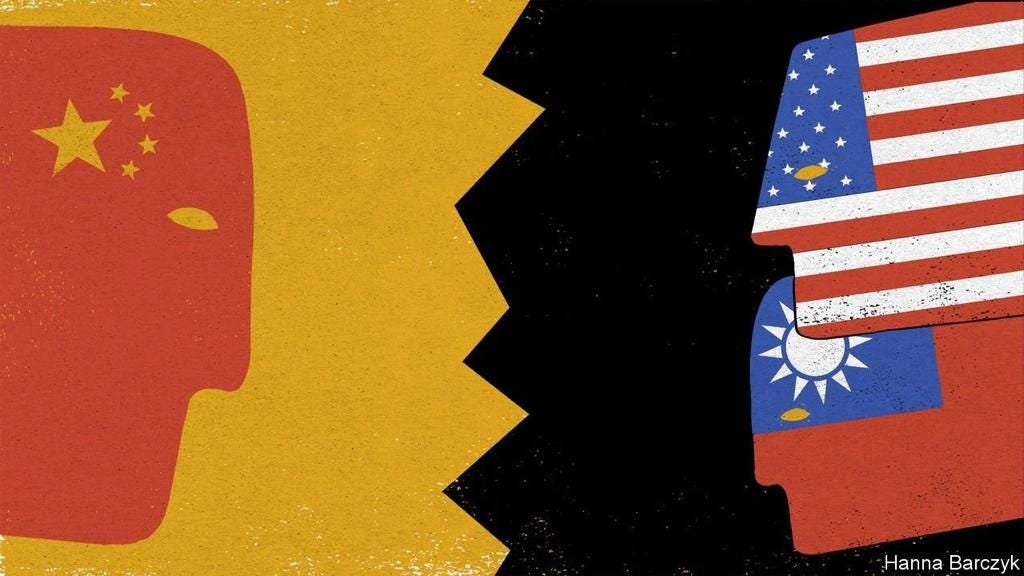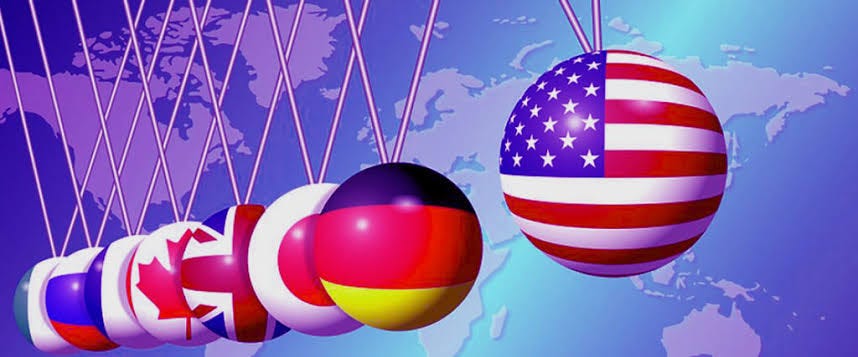What is the reason behind the tension between Taiwan and China?
If countries were people — the relationship between China, America and Taiwan would be a love triangle like no other. Taiwan is in a very complex state as far as Democratisation is concerned.
One way that people all over the world have seen Taiwan is that it's the first place in Asia to legalize same-sex marriage. It's an island of fewer than 24 million people, and yet its economy is close to one of the top 20 in the world today. But this wealthy, democratic island is not considered an independent country by Beijing. China has long viewed Taiwan as its lost territory and threatened to unify with it by force.
Under Beijing's pressure, only 15 states in the world recognize Taiwan today, down from 23 in 2016. And one key country is not on that list: the United States. The U.S. is Taiwan's biggest ally. Although there are no formal diplomatic relations between the two. The U.S. is Taiwan's biggest arms supplier, has close economic ties with the island, and is most likely to defend it. Taiwan has become the most volatile issue between the world's two greatest powers? Up to the late 19th century, Taiwan, then known as Formosa, passed through the rule of Dutch and Spanish colonizers, its aboriginal peoples, and Chinese dynasties. In 1895, the Qing dynasty of China lost Taiwan to Japan after a humiliating military defeat. Taiwan was then ruled by the Japanese for the following 50 years. Japan wanted to make Taiwan into a model colony, using it as an example to persuade other Asian nations to join the Japanese empire. They raised living standards, they improved education, they improved health care centers, and built a lot of infrastructures. So that 50 years later, Taiwan was one of the more developed parts of the region. After World War II, Taiwan was returned to the control of the Chinese government, at that point, the Republic of China. The Republic of China rapidly lost the Chinese Civil War to the Communist Party of China, and as a result, ended up on Taiwan as a regime in exile with very few resources, a lot of refugees, a very poor population struggling to survive.
Taiwan relied heavily on U.S. economic aid, but by the middle of the 1960s, most of that aid was frozen as the U.S. wanted Taiwan to develop its economy. So Taiwan changed its strategy, moving from an import substitution policy to an export-oriented economy, which imported homemade goods all over the globe. Taiwan moved quickly towards exporting very cheap, mostly consumer goods to the United States. And as a consequence, over the next 20 to 30 years, Taiwan's economy ‘boomed’. So beginning of the 1980s, the government in Taiwan started to think about how do we take the next step in our economic development? They stumbled upon what is called ’Semi-Conductors’ which were also considered as a critical part of the growing technology.That took off in the 1990s with the growth of Taiwan Semiconductor Manufacturing Company that which today is a crucial company for any company that's making technology. Their chips are everywhere — smartphones, tablets, computers, game consoles, and in cars as well. Anything that you need chips for you have to come to the TSMC.
This by extension puts Taiwan in a fairly strong position that it is a key node in the tech supply chain globally. And so it is a valuable partner for every single country in the world. Alongside this economic shift, Taiwan's political landscape also changed dramatically. Under the rule of the Chinese Nationalist Party, or KMT, for four decades Taiwan was an authoritarian regime until the end of martial law in the late 1980s. Then Taiwan gradually transitioned to democracy. The first direct presidential elections took place in 1996, followed by several peaceful transfers of power. So the Democratic Progressive Party is the current party that governs Taiwan. They were a party that came out of this movement of activists pushing for more democracy in Taiwan in the 1970s. And their fundamental stance is that Taiwan is already an ‘Independent Country’. But this isn't the same stance held by Beijing. So from the People's Republic of China, the PRC's perspective, Taiwan remains the last piece of an unfinished civil war. It's an illegitimate regime, a breakaway territory that needs to be unified with the motherland. The Chiang Kai-shek regime won a reprieve in June 1950 when the Korean War broke out. The United States then stepped in to prevent a final Chinese Communist Party, a CCP-led invasion of the island of Taiwan.
The United States has been there ever since as the guarantor of Taiwan's security. Despite this guarantee of security, in 1979, the U.S. broke ties with the Republic of China on Taiwan and established them with the People's Republic of China in Beijing. Things get complicated here. The United States, in one of our communique with the People's Republic of China, acknowledged the PRC position that Taiwan was part of China. But the United States also did not accept the PRC claim to Taiwan. As an effect, the U.S. views Taiwan's status as undetermined. But even after 1979, they've maintained informal relations with Taiwan and continue to invest here, continue to support the economy, and most importantly, continued to sell arms to Taiwan. With the U.S. in the middle, China and Taiwan have avoided war for over seven decades, but tensions between the two sides have risen in recent years. Emerging as a superpower on the world stage, China has become more assertive in its claims of sovereignty over Taiwan. While most of the Taiwanese prefer maintaining the status quo, for now, many young people favor overt independence for Taiwan.
The young people have been at the heart of this political transformation we're seeing in Taiwan over the past decade when they started pushing back against this economic integration between China and Taiwan that started under former President Ma Ying-jeou. One of the best examples was the Sunflower Movement that broke out in March of 2014. This movement was led mostly by college students opposed to negotiations with Beijing over a free-trade agreement. The movement occupied the Legislative Yuan, Taiwan's parliament, for more than three weeks to block that parliament from considering this trade agreement and voting on it. So in effect, the Sunflower Movement protesters blocked further economic integration with mainland China. Since the Sunflower Movement, the China-friendly KMT party has seen its polling numbers decline steeply while the DPP leader, Tsai Ing-wen, won the presidential elections in 2016 and was re-elected in 2020. So she has, as her bottom line effectively that Taiwan is an independent sovereign nation. Her stance is that we're willing to talk but only as ‘equals’. And that is a position that Beijing is unwilling to accept. China cut official communications with Taiwan in 2016 and stopped individual travel permits to the island in 2019. It's also upped the rhetoric on taking control of Taiwan and increased military maneuvers, all of which is a concern for the U.S. Taiwan is by far the most likely issue to draw the United States and China into a direct military conflict. If China and Taiwan did eventually go to war, there could be a devastating cost to human life and industry.
Even if China manages, they could spend years rebuilding Taiwan and struggle to integrate a hostile population. So it would be an incredibly dangerous, messy affair. The attempt to invade a fortified island is always going to be an incredibly difficult one. So there's a very good reason they have not attempted to take Taiwan by military force. It's because they're not sure they can do so. And so it would be a disastrous event for everybody involved. And there's a very good chance that other democracies in this region, certainly Japan, maybe Australia, would get drawn in as well. Put quite simply, it's in everybody's best interest right now not to force the issue and to push it off for another few years or maybe even a few decades. But the unification would signal to the world that it's China, not the U.S., that's the new dominant power in the region. Being able to bring Taiwan into the PRC fold would be a huge achievement for any Chinese leader. And it's largely seen as being one of his ambitions to achieve before he steps down, whenever that may be. Taiwan's future depends on if our allies would take China seriously. it’d depend on the attitude of the western countries towards China because if the Western countries, for example, the U.S. starts to see Taiwan as an important geopolitical ally, then Taiwan could become a beacon of democracy in the Chinese-speaking world.
If not, the western countries would like to see China growing over the influence over the world, then... They can just let China be. The Trump administration showed strong support for Taiwan by providing more weapons, sending high-level officials to visit, and changing the law to make interactions between the two sides much easier. In June, a U.S. delegation visited Taipei and announced plans to donate 750,000 doses of Covid-19 vaccines to help alleviate its shortage of shots. Since Biden has taken office, the people he's put in place so far at least have repeated the Trump administration's position on Taiwan, and have taken quite strong stands in favor of that approach to Taiwan, ignoring or pushing back against Beijing's objections. But obviously, we'll have to see over the next four, potentially eight years to see how strong that support for Taiwan is.
Catch you the following Monday!










